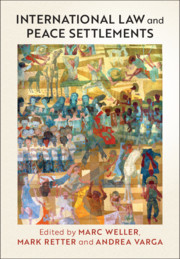Book contents
- International Law and Peace Settlements
- International Law and Peace Settlements
- Copyright page
- Contents
- Contributors
- Preface and Acknowledgements
- Case Law
- Peace Agreements and Instruments
- Abbreviations
- 1 Introduction
- Part I Historical Dimensions to Peace Settlement Practice
- Part II Peace Agreements As Legal Instruments
- Part III Key Actors and the Role of International Law
- Part IV Representation, Sovereignty and Governance
- 13 Inclusion and Women in Peace Processes
- 14 National Dialogues and the Resolution of Violent Conflicts
- 15 Advancing Peaceful Settlement and Democratisation
- 16 Power Sharing and Peace Settlements
- 17 Resolving Religious Conflicts through Peace Agreements
- 18 Self-Determination and Peace-Making
- 19 Peace Agreements and Territorial Change
- Part V Economic Aspects of Peace Settlements
- Part VI Humanitarian Obligations and Human Rights
- Conclusion
- Index
15 - Advancing Peaceful Settlement and Democratisation
The Doubtful Usefulness of International Electoral Norms
from Part IV - Representation, Sovereignty and Governance
Published online by Cambridge University Press: 14 January 2021
- International Law and Peace Settlements
- International Law and Peace Settlements
- Copyright page
- Contents
- Contributors
- Preface and Acknowledgements
- Case Law
- Peace Agreements and Instruments
- Abbreviations
- 1 Introduction
- Part I Historical Dimensions to Peace Settlement Practice
- Part II Peace Agreements As Legal Instruments
- Part III Key Actors and the Role of International Law
- Part IV Representation, Sovereignty and Governance
- 13 Inclusion and Women in Peace Processes
- 14 National Dialogues and the Resolution of Violent Conflicts
- 15 Advancing Peaceful Settlement and Democratisation
- 16 Power Sharing and Peace Settlements
- 17 Resolving Religious Conflicts through Peace Agreements
- 18 Self-Determination and Peace-Making
- 19 Peace Agreements and Territorial Change
- Part V Economic Aspects of Peace Settlements
- Part VI Humanitarian Obligations and Human Rights
- Conclusion
- Index
Summary
Although democratisation can be a vital component of peace settlements, formulaic applications of supposed international norms of democratic governance are potentially counterproductive. Each conflict situation is different; many situations do not admit of prefabricated solutions that one can justly expect all reasonable contestants to accept, either at the outset or as events develop. Procedural standards associated with the ‘democratic entitlement’ obscure the underlying purposes that democratic forms, to be meaningful, need to fulfil. Post-conflict conditions, typically marked by sharp social divisions and a lack of agreement on the political community’s basic premises, are precisely the conditions in which it cannot be taken for granted that standard procedural norms will work to produce democratic social realities. Improvisation is thus essential. Peace and democracy may both be better served if the international lawyers stand aside.
Keywords
- Type
- Chapter
- Information
- International Law and Peace Settlements , pp. 333 - 355Publisher: Cambridge University PressPrint publication year: 2021



